Nursing Case Study on Ethical and Legal Issues in Patient Care
VerifiedAdded on 2023/06/07
|7
|1706
|136
AI Summary
This nursing case study discusses the ethical and legal issues in patient care, specifically in the case of a 15-year-old girl with suspected pregnancy. The study explores the dilemma of respecting patient autonomy while ensuring best nursing practice and legal compliance. It also delves into the importance of confidentiality and privacy in healthcare and the role of therapeutic relationship in building trust with patients.
Contribute Materials
Your contribution can guide someone’s learning journey. Share your
documents today.
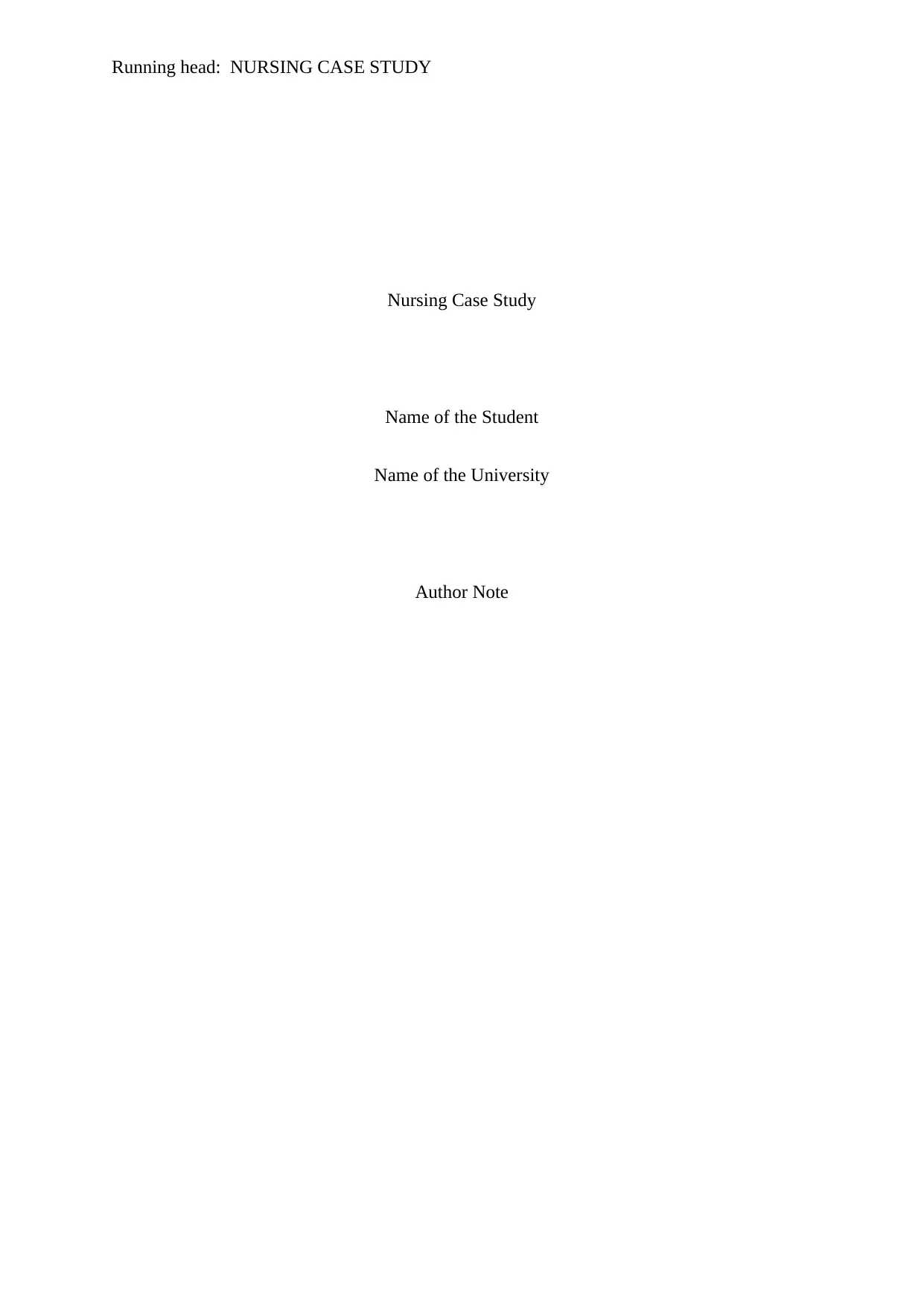
Running head: NURSING CASE STUDY
Nursing Case Study
Name of the Student
Name of the University
Author Note
Nursing Case Study
Name of the Student
Name of the University
Author Note
Secure Best Marks with AI Grader
Need help grading? Try our AI Grader for instant feedback on your assignments.
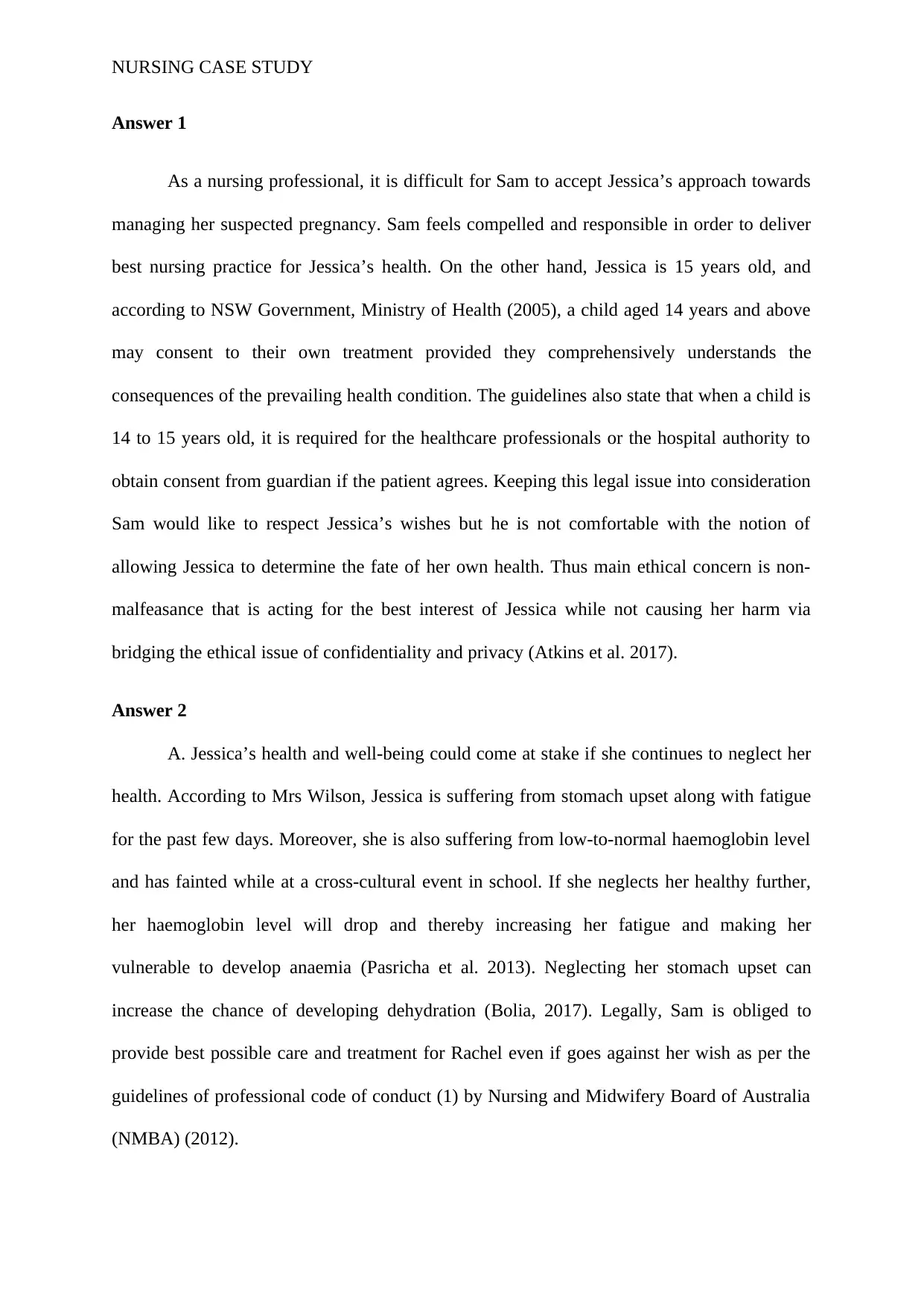
NURSING CASE STUDY
Answer 1
As a nursing professional, it is difficult for Sam to accept Jessica’s approach towards
managing her suspected pregnancy. Sam feels compelled and responsible in order to deliver
best nursing practice for Jessica’s health. On the other hand, Jessica is 15 years old, and
according to NSW Government, Ministry of Health (2005), a child aged 14 years and above
may consent to their own treatment provided they comprehensively understands the
consequences of the prevailing health condition. The guidelines also state that when a child is
14 to 15 years old, it is required for the healthcare professionals or the hospital authority to
obtain consent from guardian if the patient agrees. Keeping this legal issue into consideration
Sam would like to respect Jessica’s wishes but he is not comfortable with the notion of
allowing Jessica to determine the fate of her own health. Thus main ethical concern is non-
malfeasance that is acting for the best interest of Jessica while not causing her harm via
bridging the ethical issue of confidentiality and privacy (Atkins et al. 2017).
Answer 2
A. Jessica’s health and well-being could come at stake if she continues to neglect her
health. According to Mrs Wilson, Jessica is suffering from stomach upset along with fatigue
for the past few days. Moreover, she is also suffering from low-to-normal haemoglobin level
and has fainted while at a cross-cultural event in school. If she neglects her healthy further,
her haemoglobin level will drop and thereby increasing her fatigue and making her
vulnerable to develop anaemia (Pasricha et al. 2013). Neglecting her stomach upset can
increase the chance of developing dehydration (Bolia, 2017). Legally, Sam is obliged to
provide best possible care and treatment for Rachel even if goes against her wish as per the
guidelines of professional code of conduct (1) by Nursing and Midwifery Board of Australia
(NMBA) (2012).
Answer 1
As a nursing professional, it is difficult for Sam to accept Jessica’s approach towards
managing her suspected pregnancy. Sam feels compelled and responsible in order to deliver
best nursing practice for Jessica’s health. On the other hand, Jessica is 15 years old, and
according to NSW Government, Ministry of Health (2005), a child aged 14 years and above
may consent to their own treatment provided they comprehensively understands the
consequences of the prevailing health condition. The guidelines also state that when a child is
14 to 15 years old, it is required for the healthcare professionals or the hospital authority to
obtain consent from guardian if the patient agrees. Keeping this legal issue into consideration
Sam would like to respect Jessica’s wishes but he is not comfortable with the notion of
allowing Jessica to determine the fate of her own health. Thus main ethical concern is non-
malfeasance that is acting for the best interest of Jessica while not causing her harm via
bridging the ethical issue of confidentiality and privacy (Atkins et al. 2017).
Answer 2
A. Jessica’s health and well-being could come at stake if she continues to neglect her
health. According to Mrs Wilson, Jessica is suffering from stomach upset along with fatigue
for the past few days. Moreover, she is also suffering from low-to-normal haemoglobin level
and has fainted while at a cross-cultural event in school. If she neglects her healthy further,
her haemoglobin level will drop and thereby increasing her fatigue and making her
vulnerable to develop anaemia (Pasricha et al. 2013). Neglecting her stomach upset can
increase the chance of developing dehydration (Bolia, 2017). Legally, Sam is obliged to
provide best possible care and treatment for Rachel even if goes against her wish as per the
guidelines of professional code of conduct (1) by Nursing and Midwifery Board of Australia
(NMBA) (2012).
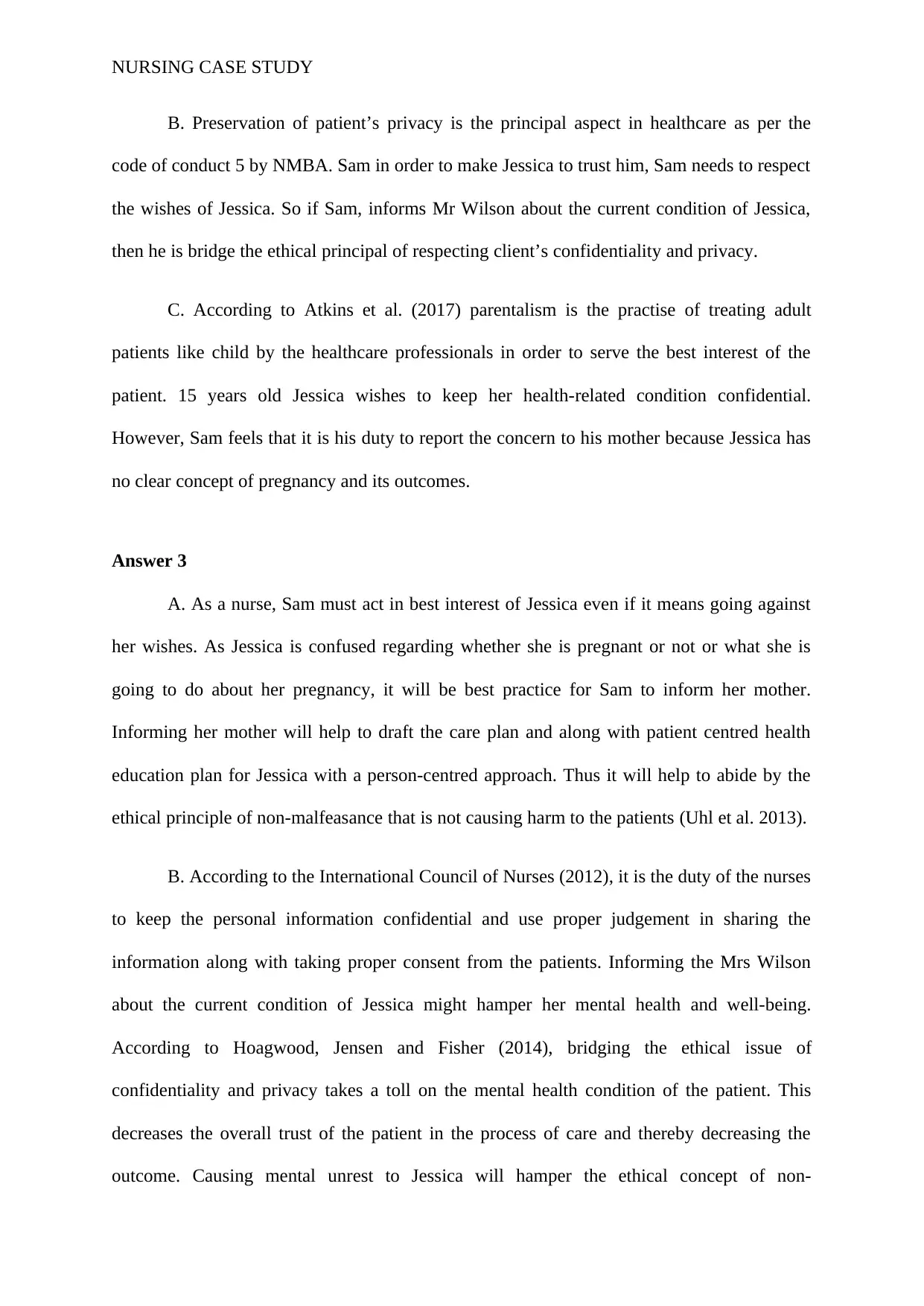
NURSING CASE STUDY
B. Preservation of patient’s privacy is the principal aspect in healthcare as per the
code of conduct 5 by NMBA. Sam in order to make Jessica to trust him, Sam needs to respect
the wishes of Jessica. So if Sam, informs Mr Wilson about the current condition of Jessica,
then he is bridge the ethical principal of respecting client’s confidentiality and privacy.
C. According to Atkins et al. (2017) parentalism is the practise of treating adult
patients like child by the healthcare professionals in order to serve the best interest of the
patient. 15 years old Jessica wishes to keep her health-related condition confidential.
However, Sam feels that it is his duty to report the concern to his mother because Jessica has
no clear concept of pregnancy and its outcomes.
Answer 3
A. As a nurse, Sam must act in best interest of Jessica even if it means going against
her wishes. As Jessica is confused regarding whether she is pregnant or not or what she is
going to do about her pregnancy, it will be best practice for Sam to inform her mother.
Informing her mother will help to draft the care plan and along with patient centred health
education plan for Jessica with a person-centred approach. Thus it will help to abide by the
ethical principle of non-malfeasance that is not causing harm to the patients (Uhl et al. 2013).
B. According to the International Council of Nurses (2012), it is the duty of the nurses
to keep the personal information confidential and use proper judgement in sharing the
information along with taking proper consent from the patients. Informing the Mrs Wilson
about the current condition of Jessica might hamper her mental health and well-being.
According to Hoagwood, Jensen and Fisher (2014), bridging the ethical issue of
confidentiality and privacy takes a toll on the mental health condition of the patient. This
decreases the overall trust of the patient in the process of care and thereby decreasing the
outcome. Causing mental unrest to Jessica will hamper the ethical concept of non-
B. Preservation of patient’s privacy is the principal aspect in healthcare as per the
code of conduct 5 by NMBA. Sam in order to make Jessica to trust him, Sam needs to respect
the wishes of Jessica. So if Sam, informs Mr Wilson about the current condition of Jessica,
then he is bridge the ethical principal of respecting client’s confidentiality and privacy.
C. According to Atkins et al. (2017) parentalism is the practise of treating adult
patients like child by the healthcare professionals in order to serve the best interest of the
patient. 15 years old Jessica wishes to keep her health-related condition confidential.
However, Sam feels that it is his duty to report the concern to his mother because Jessica has
no clear concept of pregnancy and its outcomes.
Answer 3
A. As a nurse, Sam must act in best interest of Jessica even if it means going against
her wishes. As Jessica is confused regarding whether she is pregnant or not or what she is
going to do about her pregnancy, it will be best practice for Sam to inform her mother.
Informing her mother will help to draft the care plan and along with patient centred health
education plan for Jessica with a person-centred approach. Thus it will help to abide by the
ethical principle of non-malfeasance that is not causing harm to the patients (Uhl et al. 2013).
B. According to the International Council of Nurses (2012), it is the duty of the nurses
to keep the personal information confidential and use proper judgement in sharing the
information along with taking proper consent from the patients. Informing the Mrs Wilson
about the current condition of Jessica might hamper her mental health and well-being.
According to Hoagwood, Jensen and Fisher (2014), bridging the ethical issue of
confidentiality and privacy takes a toll on the mental health condition of the patient. This
decreases the overall trust of the patient in the process of care and thereby decreasing the
outcome. Causing mental unrest to Jessica will hamper the ethical concept of non-
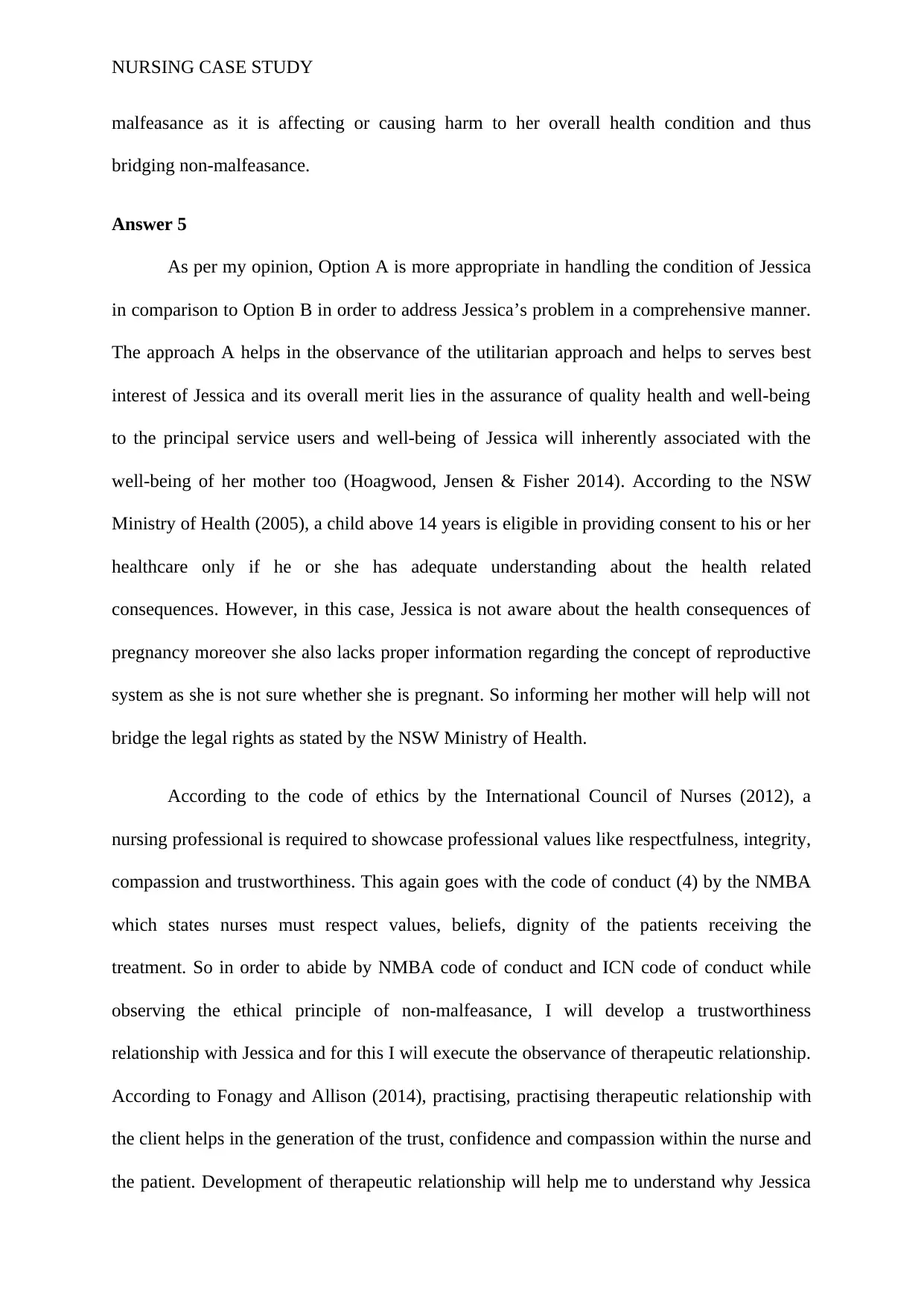
NURSING CASE STUDY
malfeasance as it is affecting or causing harm to her overall health condition and thus
bridging non-malfeasance.
Answer 5
As per my opinion, Option A is more appropriate in handling the condition of Jessica
in comparison to Option B in order to address Jessica’s problem in a comprehensive manner.
The approach A helps in the observance of the utilitarian approach and helps to serves best
interest of Jessica and its overall merit lies in the assurance of quality health and well-being
to the principal service users and well-being of Jessica will inherently associated with the
well-being of her mother too (Hoagwood, Jensen & Fisher 2014). According to the NSW
Ministry of Health (2005), a child above 14 years is eligible in providing consent to his or her
healthcare only if he or she has adequate understanding about the health related
consequences. However, in this case, Jessica is not aware about the health consequences of
pregnancy moreover she also lacks proper information regarding the concept of reproductive
system as she is not sure whether she is pregnant. So informing her mother will help will not
bridge the legal rights as stated by the NSW Ministry of Health.
According to the code of ethics by the International Council of Nurses (2012), a
nursing professional is required to showcase professional values like respectfulness, integrity,
compassion and trustworthiness. This again goes with the code of conduct (4) by the NMBA
which states nurses must respect values, beliefs, dignity of the patients receiving the
treatment. So in order to abide by NMBA code of conduct and ICN code of conduct while
observing the ethical principle of non-malfeasance, I will develop a trustworthiness
relationship with Jessica and for this I will execute the observance of therapeutic relationship.
According to Fonagy and Allison (2014), practising, practising therapeutic relationship with
the client helps in the generation of the trust, confidence and compassion within the nurse and
the patient. Development of therapeutic relationship will help me to understand why Jessica
malfeasance as it is affecting or causing harm to her overall health condition and thus
bridging non-malfeasance.
Answer 5
As per my opinion, Option A is more appropriate in handling the condition of Jessica
in comparison to Option B in order to address Jessica’s problem in a comprehensive manner.
The approach A helps in the observance of the utilitarian approach and helps to serves best
interest of Jessica and its overall merit lies in the assurance of quality health and well-being
to the principal service users and well-being of Jessica will inherently associated with the
well-being of her mother too (Hoagwood, Jensen & Fisher 2014). According to the NSW
Ministry of Health (2005), a child above 14 years is eligible in providing consent to his or her
healthcare only if he or she has adequate understanding about the health related
consequences. However, in this case, Jessica is not aware about the health consequences of
pregnancy moreover she also lacks proper information regarding the concept of reproductive
system as she is not sure whether she is pregnant. So informing her mother will help will not
bridge the legal rights as stated by the NSW Ministry of Health.
According to the code of ethics by the International Council of Nurses (2012), a
nursing professional is required to showcase professional values like respectfulness, integrity,
compassion and trustworthiness. This again goes with the code of conduct (4) by the NMBA
which states nurses must respect values, beliefs, dignity of the patients receiving the
treatment. So in order to abide by NMBA code of conduct and ICN code of conduct while
observing the ethical principle of non-malfeasance, I will develop a trustworthiness
relationship with Jessica and for this I will execute the observance of therapeutic relationship.
According to Fonagy and Allison (2014), practising, practising therapeutic relationship with
the client helps in the generation of the trust, confidence and compassion within the nurse and
the patient. Development of therapeutic relationship will help me to understand why Jessica
Secure Best Marks with AI Grader
Need help grading? Try our AI Grader for instant feedback on your assignments.
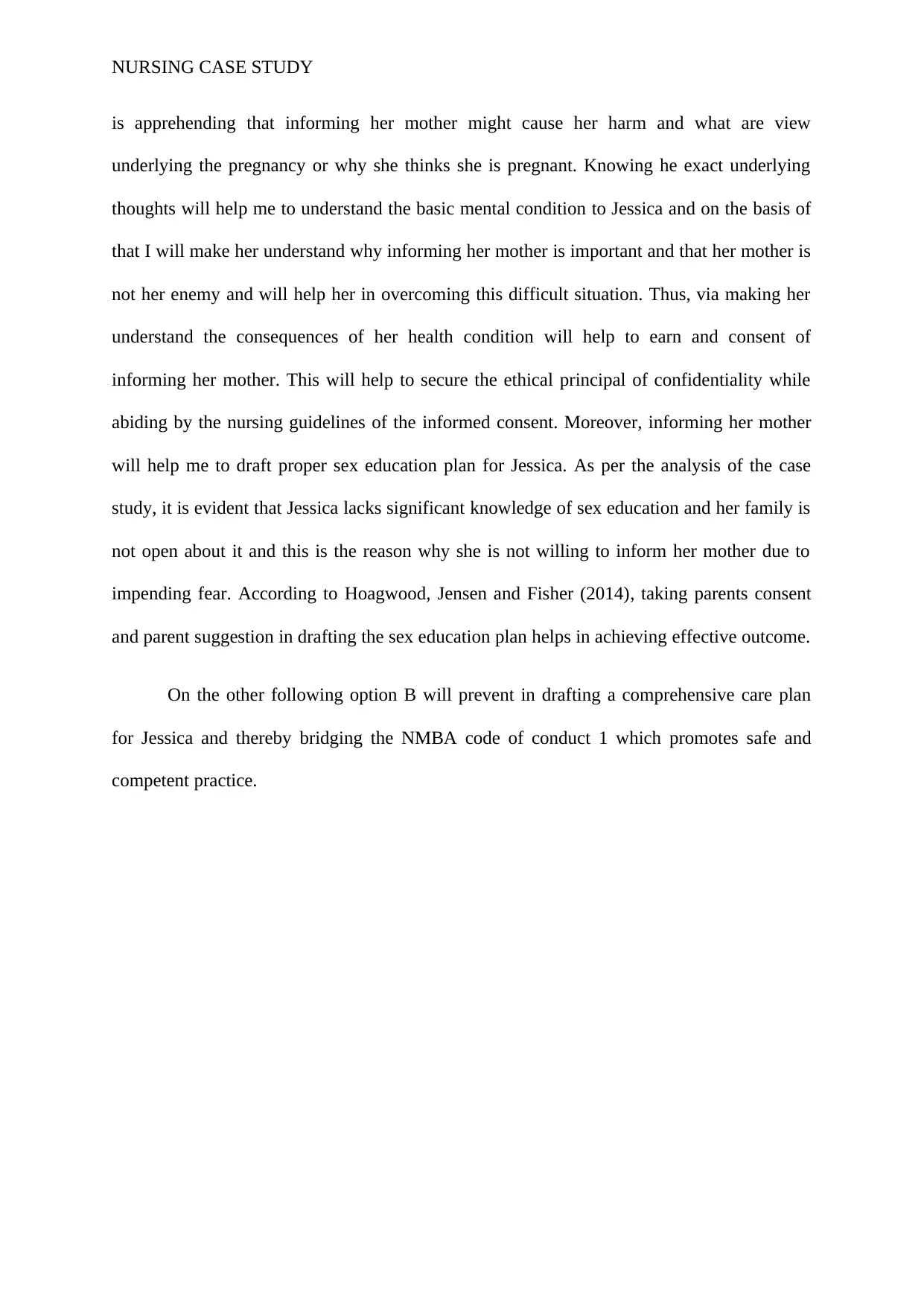
NURSING CASE STUDY
is apprehending that informing her mother might cause her harm and what are view
underlying the pregnancy or why she thinks she is pregnant. Knowing he exact underlying
thoughts will help me to understand the basic mental condition to Jessica and on the basis of
that I will make her understand why informing her mother is important and that her mother is
not her enemy and will help her in overcoming this difficult situation. Thus, via making her
understand the consequences of her health condition will help to earn and consent of
informing her mother. This will help to secure the ethical principal of confidentiality while
abiding by the nursing guidelines of the informed consent. Moreover, informing her mother
will help me to draft proper sex education plan for Jessica. As per the analysis of the case
study, it is evident that Jessica lacks significant knowledge of sex education and her family is
not open about it and this is the reason why she is not willing to inform her mother due to
impending fear. According to Hoagwood, Jensen and Fisher (2014), taking parents consent
and parent suggestion in drafting the sex education plan helps in achieving effective outcome.
On the other following option B will prevent in drafting a comprehensive care plan
for Jessica and thereby bridging the NMBA code of conduct 1 which promotes safe and
competent practice.
is apprehending that informing her mother might cause her harm and what are view
underlying the pregnancy or why she thinks she is pregnant. Knowing he exact underlying
thoughts will help me to understand the basic mental condition to Jessica and on the basis of
that I will make her understand why informing her mother is important and that her mother is
not her enemy and will help her in overcoming this difficult situation. Thus, via making her
understand the consequences of her health condition will help to earn and consent of
informing her mother. This will help to secure the ethical principal of confidentiality while
abiding by the nursing guidelines of the informed consent. Moreover, informing her mother
will help me to draft proper sex education plan for Jessica. As per the analysis of the case
study, it is evident that Jessica lacks significant knowledge of sex education and her family is
not open about it and this is the reason why she is not willing to inform her mother due to
impending fear. According to Hoagwood, Jensen and Fisher (2014), taking parents consent
and parent suggestion in drafting the sex education plan helps in achieving effective outcome.
On the other following option B will prevent in drafting a comprehensive care plan
for Jessica and thereby bridging the NMBA code of conduct 1 which promotes safe and
competent practice.
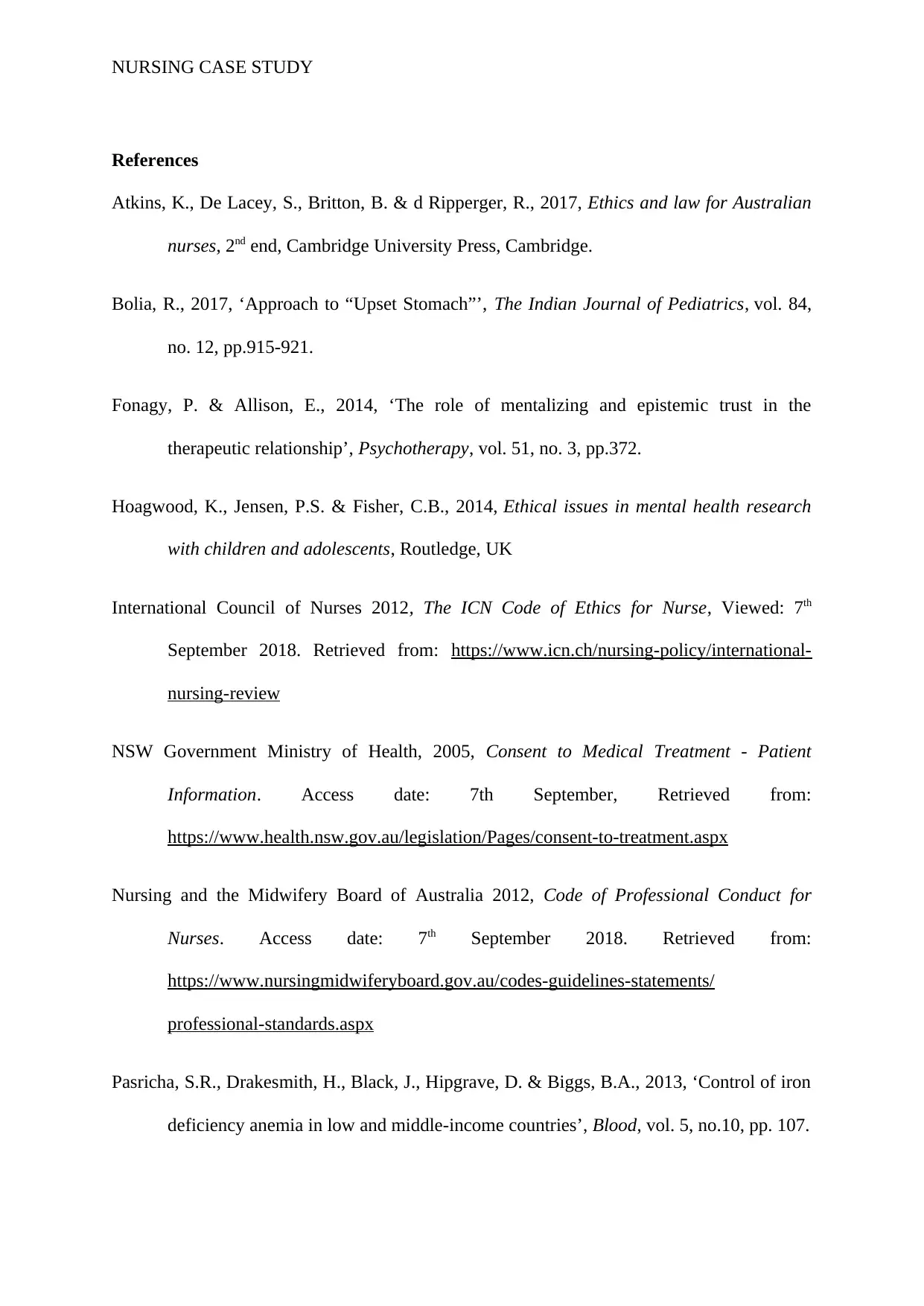
NURSING CASE STUDY
References
Atkins, K., De Lacey, S., Britton, B. & d Ripperger, R., 2017, Ethics and law for Australian
nurses, 2nd end, Cambridge University Press, Cambridge.
Bolia, R., 2017, ‘Approach to “Upset Stomach”’, The Indian Journal of Pediatrics, vol. 84,
no. 12, pp.915-921.
Fonagy, P. & Allison, E., 2014, ‘The role of mentalizing and epistemic trust in the
therapeutic relationship’, Psychotherapy, vol. 51, no. 3, pp.372.
Hoagwood, K., Jensen, P.S. & Fisher, C.B., 2014, Ethical issues in mental health research
with children and adolescents, Routledge, UK
International Council of Nurses 2012, The ICN Code of Ethics for Nurse, Viewed: 7th
September 2018. Retrieved from: https://www.icn.ch/nursing-policy/international-
nursing-review
NSW Government Ministry of Health, 2005, Consent to Medical Treatment - Patient
Information. Access date: 7th September, Retrieved from:
https://www.health.nsw.gov.au/legislation/Pages/consent-to-treatment.aspx
Nursing and the Midwifery Board of Australia 2012, Code of Professional Conduct for
Nurses. Access date: 7th September 2018. Retrieved from:
https://www.nursingmidwiferyboard.gov.au/codes-guidelines-statements/
professional-standards.aspx
Pasricha, S.R., Drakesmith, H., Black, J., Hipgrave, D. & Biggs, B.A., 2013, ‘Control of iron
deficiency anemia in low and middle-income countries’, Blood, vol. 5, no.10, pp. 107.
References
Atkins, K., De Lacey, S., Britton, B. & d Ripperger, R., 2017, Ethics and law for Australian
nurses, 2nd end, Cambridge University Press, Cambridge.
Bolia, R., 2017, ‘Approach to “Upset Stomach”’, The Indian Journal of Pediatrics, vol. 84,
no. 12, pp.915-921.
Fonagy, P. & Allison, E., 2014, ‘The role of mentalizing and epistemic trust in the
therapeutic relationship’, Psychotherapy, vol. 51, no. 3, pp.372.
Hoagwood, K., Jensen, P.S. & Fisher, C.B., 2014, Ethical issues in mental health research
with children and adolescents, Routledge, UK
International Council of Nurses 2012, The ICN Code of Ethics for Nurse, Viewed: 7th
September 2018. Retrieved from: https://www.icn.ch/nursing-policy/international-
nursing-review
NSW Government Ministry of Health, 2005, Consent to Medical Treatment - Patient
Information. Access date: 7th September, Retrieved from:
https://www.health.nsw.gov.au/legislation/Pages/consent-to-treatment.aspx
Nursing and the Midwifery Board of Australia 2012, Code of Professional Conduct for
Nurses. Access date: 7th September 2018. Retrieved from:
https://www.nursingmidwiferyboard.gov.au/codes-guidelines-statements/
professional-standards.aspx
Pasricha, S.R., Drakesmith, H., Black, J., Hipgrave, D. & Biggs, B.A., 2013, ‘Control of iron
deficiency anemia in low and middle-income countries’, Blood, vol. 5, no.10, pp. 107.
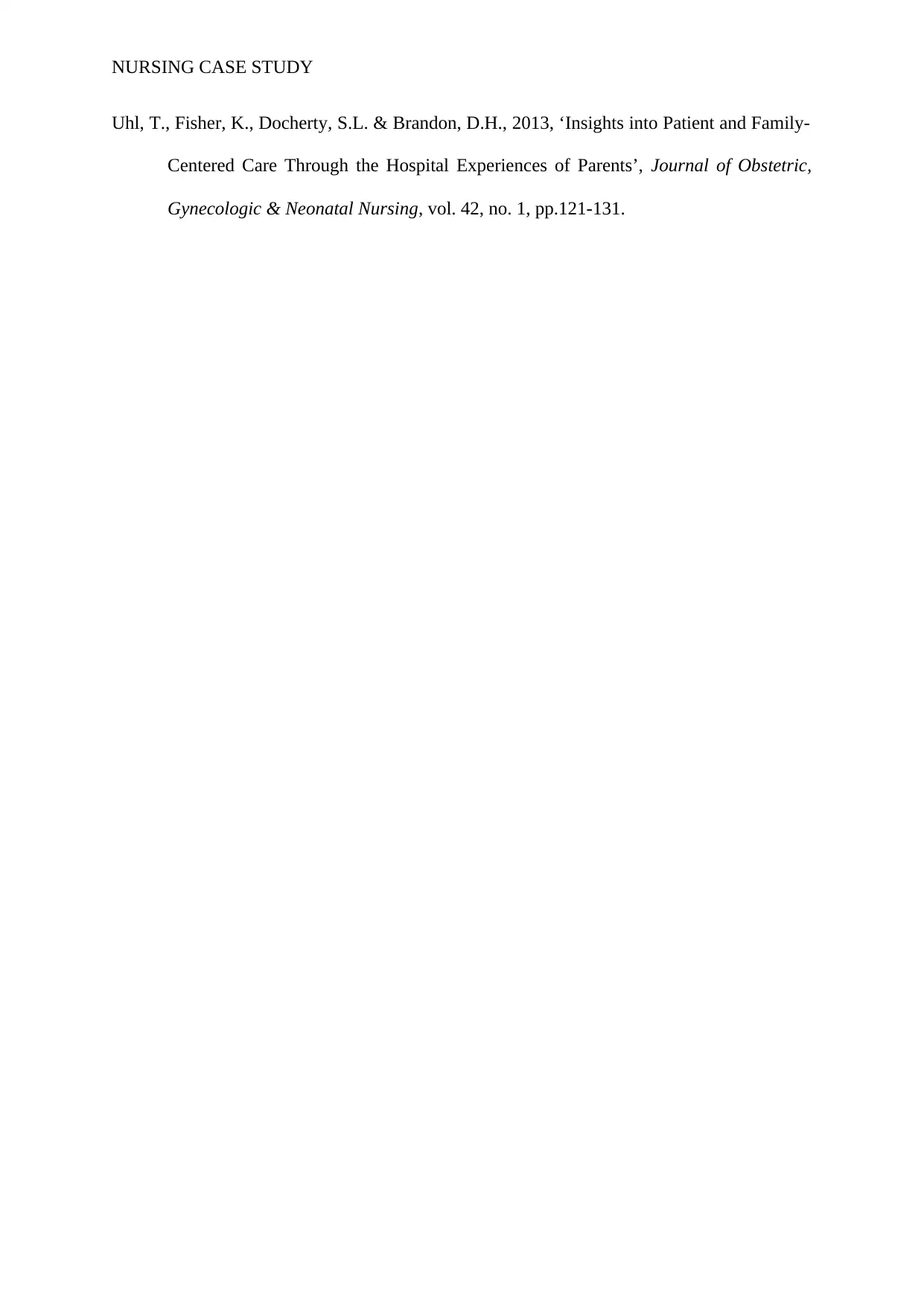
NURSING CASE STUDY
Uhl, T., Fisher, K., Docherty, S.L. & Brandon, D.H., 2013, ‘Insights into Patient and Family‐
Centered Care Through the Hospital Experiences of Parents’, Journal of Obstetric,
Gynecologic & Neonatal Nursing, vol. 42, no. 1, pp.121-131.
Uhl, T., Fisher, K., Docherty, S.L. & Brandon, D.H., 2013, ‘Insights into Patient and Family‐
Centered Care Through the Hospital Experiences of Parents’, Journal of Obstetric,
Gynecologic & Neonatal Nursing, vol. 42, no. 1, pp.121-131.
1 out of 7
Related Documents
Your All-in-One AI-Powered Toolkit for Academic Success.
+13062052269
info@desklib.com
Available 24*7 on WhatsApp / Email
![[object Object]](/_next/static/media/star-bottom.7253800d.svg)
Unlock your academic potential
© 2024 | Zucol Services PVT LTD | All rights reserved.



